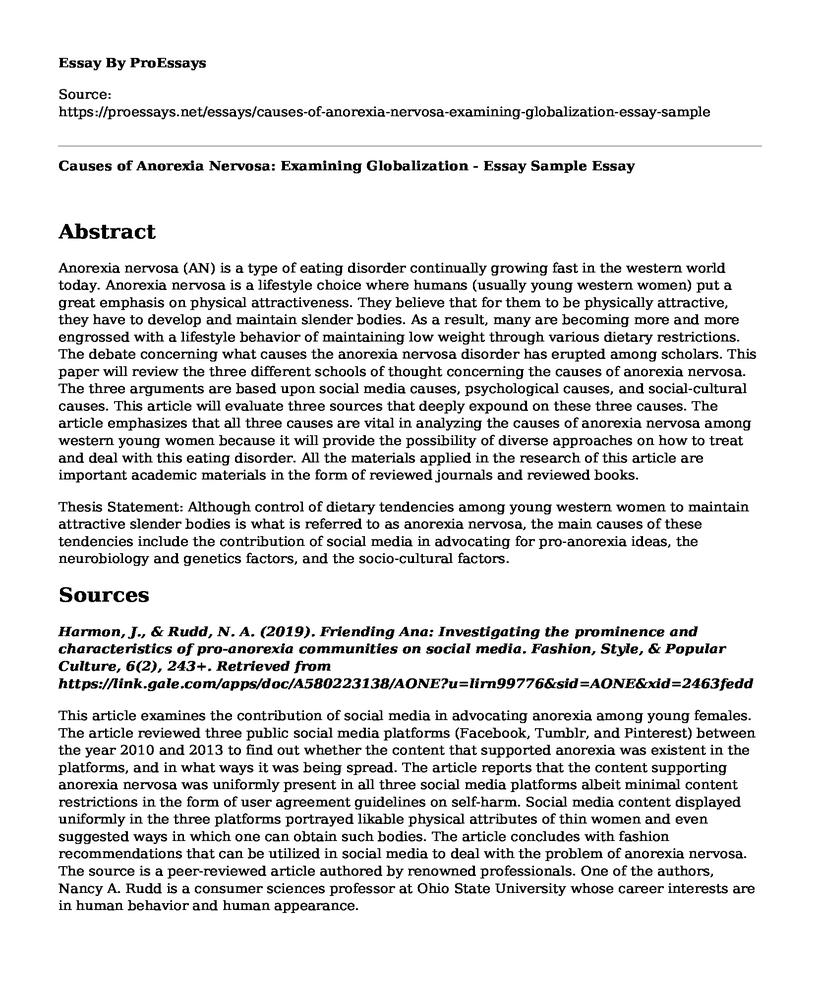Abstract
Anorexia nervosa (AN) is a type of eating disorder continually growing fast in the western world today. Anorexia nervosa is a lifestyle choice where humans (usually young western women) put a great emphasis on physical attractiveness. They believe that for them to be physically attractive, they have to develop and maintain slender bodies. As a result, many are becoming more and more engrossed with a lifestyle behavior of maintaining low weight through various dietary restrictions. The debate concerning what causes the anorexia nervosa disorder has erupted among scholars. This paper will review the three different schools of thought concerning the causes of anorexia nervosa. The three arguments are based upon social media causes, psychological causes, and social-cultural causes. This article will evaluate three sources that deeply expound on these three causes. The article emphasizes that all three causes are vital in analyzing the causes of anorexia nervosa among western young women because it will provide the possibility of diverse approaches on how to treat and deal with this eating disorder. All the materials applied in the research of this article are important academic materials in the form of reviewed journals and reviewed books.
Thesis Statement: Although control of dietary tendencies among young western women to maintain attractive slender bodies is what is referred to as anorexia nervosa, the main causes of these tendencies include the contribution of social media in advocating for pro-anorexia ideas, the neurobiology and genetics factors, and the socio-cultural factors.
Sources
Harmon, J., & Rudd, N. A. (2019). Friending Ana: Investigating the prominence and characteristics of pro-anorexia communities on social media. Fashion, Style, & Popular Culture, 6(2), 243+. Retrieved from https://link.gale.com/apps/doc/A580223138/AONE?u=lirn99776&sid=AONE&xid=2463fedd
This article examines the contribution of social media in advocating anorexia among young females. The article reviewed three public social media platforms (Facebook, Tumblr, and Pinterest) between the year 2010 and 2013 to find out whether the content that supported anorexia was existent in the platforms, and in what ways it was being spread. The article reports that the content supporting anorexia nervosa was uniformly present in all three social media platforms albeit minimal content restrictions in the form of user agreement guidelines on self-harm. Social media content displayed uniformly in the three platforms portrayed likable physical attributes of thin women and even suggested ways in which one can obtain such bodies. The article concludes with fashion recommendations that can be utilized in social media to deal with the problem of anorexia nervosa. The source is a peer-reviewed article authored by renowned professionals. One of the authors, Nancy A. Rudd is a consumer sciences professor at Ohio State University whose career interests are in human behavior and human appearance.
Kaplan, A. (2008, January). Why girls starve themselves: new research in anorexia nervosa. Psychiatric Times, 25(1), 1. Retrieved from https://link.gale.com/apps/doc/A180317152/AONE?u=lirn99776&sid=AONE&xid=f6f36b08
The source is a review of research performed by the University of California, San Diego psychiatry professor, Kaye. In the review, the author explains the work of Kaye where the article indicates that anorexia nervosa is caused by not only social and cultural factors but also genetics and neurobiology factors. The article demonstrates studies done by Kaye on anorexia nervosa patients and their families. The source shows that Kaye's research indicates that family links expose an individual to behavioral traits that cause them to result in eating disorders like anorexia nervosa. The source also displays MRI (magnetic radio imaging) and PET (position emission tomography) results from two scholars, which indicates that some brain circuits play its part in dictating the developing of anorexia nervosa. The source concludes with treatment approaches to anorexia nervosa each aimed at overcoming the discussed causes, with the source emphasizing cognitive-behavioral therapy (CBT) and the family-based Maudsley treatment. The source is a credible one because it relates to a distinguished article published from an interview with a renowned psychiatry expert. The publication is also well-known in the psychiatry field and often publishes monthly articles for academic reading by clinical psychiatrists in the US.
Spara, L., Balawejder, T., & Cautilli, J. (2008). Behavioral insights underlying mental health problems: A review of "Taking America off Drugs" by Stephen Ray Flora: Albany, New York, State University of New York Press. The International Journal of Behavioral Consultation and Therapy, 4(1), 115+. Retrieved from https://link.gale.com/apps/doc/A214102582/AONE?u=lirn99776&sid=AONE&xid=eb316b13
The source is a book review of Stephen Ray Flora's (2007) book. The authors expound on Dr. Flora's perception of common human disorders (with anorexia nervosa being one of the discussed disorder) and how they should be treated. According to this article, Dr. Flora faults the position held by drug companies on eating disorders like anorexia nervosa. In the article, Dr. Flora argues that eating disorders are behavioral issues caused by cultural and social factors rather than chemical imbalance notions held by drug companies. Dr. Flora, therefore, proposes behavioral interventions as the best treatment approach rather than the use of clinical medications that can also be disliked by a patient with eating disorders. The source is a credible scholarly article that educates psychiatrists on essential practices to undertake while dealing with eating disordered clients.
Cite this page
Causes of Anorexia Nervosa: Examining Globalization - Essay Sample. (2023, Mar 13). Retrieved from https://proessays.net/essays/causes-of-anorexia-nervosa-examining-globalization-essay-sample
If you are the original author of this essay and no longer wish to have it published on the ProEssays website, please click below to request its removal:
- Personality Disorder of Frankie in Frankie and Alice Movie Analysis
- The Growth of Social Gerontology Essay
- Benefits of Personality Characteristics and Selfefficacy in the Perceived Academic Achievement
- The Barbie Doll and Female Beauty Standards - Essay Sample
- Self-Reflection: Introduction to Management Paper Example
- Research Articles Analysis on the Behaviors of People Paper Example
- Free Essay Example: Facebook's Controversial Privacy Policies and Impact on Emotions







